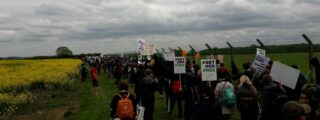On Saturday 13th May over 1,000 people took part in what campaigners say was one of the largest demonstration they had seen outside the notorious Yarl’s Wood detention center. The center is nestled near a business park a few miles from the town of Bedford, surrounded by fields and quiet country roads. It is here where the UK detains those with precarious immigration status – without a time limit.
One of eleven such sites in the UK, it holds over 350 people, mostly women. Many of the women will have fled violent situations and experienced rape, torture or abuse. Even after fleeing such abuse and seeking the UK’s safety, Yarl’s Wood has provided no haven, itself surrounded by widespread allegations of sexual abuse and mistreatment.
A three-month undercover Channel 4 investigation exposed the abuse of detainees to a wider audience via hidden cameras, capturing the sickening racism and disregard for human dignity of the center’s staff. A dossier compiled by Women Against Rape and Black Women’s Rape Action Project published in June 2015 contained hundreds of complaints of sexual abuse and mistreatment at the center over a decade. Since 2015, demonstrations organized by Movement for Justice by Any Means Necessary have been taking place at the center up to several times a year.

‘It’s about making the women inside stronger’
Ahead of Saturday’s demonstration, the Leveller discussed what Yarl’s Wood represents and the significance of taking action with Antonia Bright, lead organizer with Movement for Justice by Any Means Necessary.
She said Yarl’s Wood and other detention centers are symbolic of the ‘hostile environment’, where the state “has the power to incarcerate people because of where they’re born, because where they’re born puts them into a legal category that divides our society and our communities”.
Antonia emphasized the constant, almost daily struggle of being in detention, filing applications, trying to get answers or updates about your case, trying to stay positive and have the courage to keep fighting.
“People say that being in detention is worse than being in prison. In prison, at least there is a process of getting people ready to be released and back into the community again but in detention it feels like ‘we just want you out of the country and we don’t care what happens’.”
The UK is one of a few countries in the world and the only country in the European Union that has no upper time limit on detention, despite mounting pressure to adopt a 28-day time limit. As of the 30th June 2016, the longest length of time a person was currently held for was 1,156 days.
Despite the ongoing mental and physical harm of detention, detention centers have been the site of real struggle and resistance, representing a front-line in the fight for migrant’s rights and against systemic racism. Speaking at the demonstration another organizer with Movement for Justice, Karen Doyle told the crowd:
“The very first time we demonstrated here two years ago now, with just 40 people was because the women inside were resisting deportation by gathering in rooms and defending each other. They were writing “Freedom” and “We are not animals” on their t-shirts, on their clothes. They were refusing to cooperate, they were demonstrating, they were boycotting the canteen, they were hunger-striking.”
Antonia highlighted the importance of solidarity with the women inside, not just in words but in action:
“Psychologically and organizationally, the Yarl’s Wood demonstrations make it really concrete that there is a movement that’s alive and that the struggle that’s going on inside detention has support on the outside. It’s important to make sure what’s happening in Yarl’s Wood is not invisible and can be gotten away with. It’s about giving more power and strength to the women inside, to keep fighting and not give up.”

The importance of this strength and courage was reflected in speeches made by former detainees, addressing their ‘sisters’ inside and the 1,000-strong gathering on Saturday.
Denise, a former Yarl’s Wood detainee, began with a sly smile:
“Yarl’s Wood, I’m back. I was detained in dere for 22 months, one week and five days… I’ve got this message for you my sisters in dere. We are fighting and we won’t stop fighting until all these walls and fences are down. So just don’t be dismayed, have courage and stand up in there! I’m standin here again. And I’m in pain. Whenever I lay down, whenever I’m walkin, whenever I’m sittin I’m in pain. Because of what they did to me. When they wanted to remove me from here they gave me a slipped disk in by back. But that won’t stop me from fighting! You won’t silence me!”
Aisha, addressing the crowd, said:
“We are here, we are fighting for a Britain that is united, rather than divided. We are here because we are fighters, we are the people who refuse to entertain the ideology that it is only the rich and the powerful who can make a difference in society. We make this society, our sisters made this society. They are the people who were here scrubbing the NHS floors and making Britain a better place. But now Britain sees us and wants to put us in detention centers, they don’t want us here anymore. Well, I’m here to stay.”
One of the most moving parts of the day was the presence of another former Yarl’s Wood detainee, released just five days before the demonstration. Mabel Gawanas was held in Yarl’s Wood for three years, effectively denied a relationship with her daughter and at risk of deportation to a country where she would have little connections and support structure.
Beyond being a positive story of the power of resistance within the UK’s detention and deportation system, Mabel’s story shows the significance of mutual support that cuts across boundaries of race, religion, country, language and sexuality, as Antonia Bright emphasized:
“Mabel has always stood up in the [center’s] chapel and raised issues, she’s always pushed for people to be more organized as detainees across the center. She’s always pushed for knowing people in different units. Mabel would always be interested in other detainees and what was going on and she would encourage people to stand up for themselves.
There’s always change-overs in the center’s population as people are either deported, released or taken elsewhere. For people coming in who are new and in a strange place where you don’t know what they could do to you and you’re literally feeling like if they killed me no-one would know. All these thoughts run through your head and having support is vital.”

Mabel had been there one of the longest and would tell people about the history of the center, about the hunger strikes and resistance. She helped other women with their paperwork while working on her own case.
Standing outside Yarl’s Wood less than a week after her release she had a simple, powerful message for the gathered protesters and the women inside.
“You cannot do everything that the immigration officers tell us, we have to resist and fight for ourselves, for our freedom. Mothers are separated from children, disabled people are kept who cannot help themselves, mentally ill detainees are kept, who don’t have proper help and support. The managers and the officers are hopeless, they are not professional people who can deal with victims of torture, victims of rape.
But we want our freedom, we want to be with our loved ones. Nobody should be detained and nobody should be kept against their will, they are forced into detention. It was not our will – we are forced and mistreated in Yarl’s Wood. So girls, I come here to tell you stand up for yourselves and fight. Do as I do, follow my steps and don’t give up. I’m so happy to come here, I told you I would come back and I have kept my promise. I am here with you, I will never forget you.”
‘We’re looking down two paths for Britain’
Whether it’s within Parliamentary reports, detailed research and suggestions for change, legal pressure or the growing movement on the ground, immigration detention is a policy beset on all sides.
Antonia argued that there was no time to be despondent or sit and reflect on the “world we’ve got”.
“We’re kind of looking down two different paths and this isn’t the time to be giving up, not at all, this is a time to be fighting. With a strong fight made we can see things turn around, that’s up to us. We’re not in the situation where we can sit there and say it’s all doom and gloom, that’s not going to solve anything.
What we need to know is what can we learn from the struggles inside detention and how can we support them. We need to take the lessons and inspiration from their struggles. This is the time to be waking up and people are waking up. There’s lots of reason to have hope, looking at the ways people are already standing up and resisting.”
Images: Authors own



